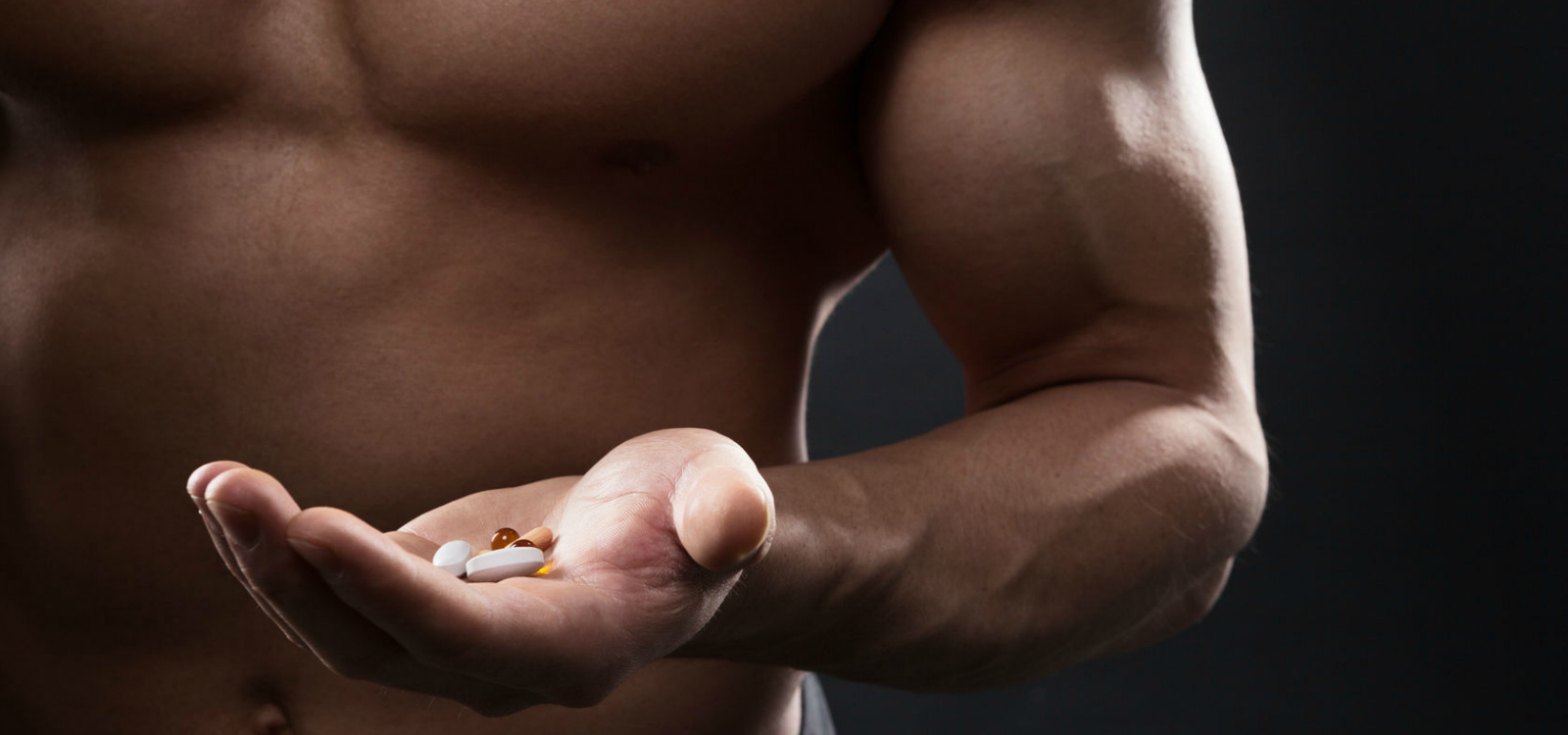You’ve probably heard that creatine is one of the few supplements that don’t suck…and you’ve heard right.
It’s the most well-researched molecule in all of sports nutrition–the subject of hundreds of scientific studies–and its benefits are clear:
- It helps you build muscle faster.
- It helps you get stronger faster.
- It improves anaerobic endurance.
- It improves muscle recovery.
What isn’t so clear, though, is which form you should take and why.
Is something fancy sounding like creatine nitrate worth it?
What about ethyl ester or hydrochloride?
Liquid or powder?
Buffered or micronized?
Or can the old faithful creatine monohydrate give you everything you need?
Well, this article is going to answer all these questions and more, and by the end, you’ll know how to get the most bang for your creatine buck.
(If you’d prefer to skip all of the scientific mumbo jumbo, though, and you just want to know which creatine supplement you should take to reach your goals, no problem! Just take the Legion Supplement Finder Quiz, and in less than a minute, you’ll know exactly what supplements are right for you. Click here to check it out.)
Want to listen to more stuff like this? Check out my podcast!
What is Creatine?
Creatine is a molecule produced in the body and found in fairly high amounts in foods like meat, eggs, and fish.
It’s comprised of several amino acids–L-arginine, glycine, and L-methionine–and it’s present in almost all cells and acts as an “energy reserve.”
It does this by accelerating a process through which cellular energy (ATP) is generated, which increases the amount of work cells can do.
The vast majority of creatine is stored in the muscle cells, which is why supplementation with it is particularly effective for improving strength and power and anaerobic capacity.
How Does Creatine Help You Build Muscle?

There are several ways that creatine helps you build muscle faster.
1. More strength and muscle endurance in your workouts means more effective workouts.
The harder you’re able to train, the more muscle you’ll gain over time.
2. Better muscle recovery means better workouts, too.
The faster your body is able to recover from a workout, the better it will perform in the next session.
This is obviously true of individual body parts but is applies systemically as well.
That is, if you do a heavy deadlift session on Monday and heavy squat session on Wednesday, the faster your body can recover from Monday’s workout, the better Wednesday’s will be.
3. Creatine has a “cellular swelling” effect.
Research shows that creatine supplementation increases the amount of water held in muscle cells.
This makes your muscles appear bigger, but more importantly, it positively affects nitrogen balance and the expression of certain genes related to hypertrophy.
4. Creatine has anti-catabolic properties.
Studies show that creatine can reduce protein degradation rates, which can help with muscle gain over time.
And the best part is there are really no downsides to supplementing with creatine.
Claims that it’s bad for your kidneys have been categorically and repeatedly disproven, the bloating complaints of the past are more or less a non-issue now, and it doesn’t “shut down natural production” a la steroids.
(That said, it’s worth noting that people with kidney disease are not advised to supplement with creatine.)
So, as you can see, I highly recommend that you supplement with creatine because it’s safe, cheap, and effective.
Which type do I recommend, though?
Keep reading!
Which Type of Creatine Should You Take?

If you want to take creatine, you need to know which forms work, which don’t, and which are overhyped and overpriced.
Well, that’s what we’re going to cover in this section of the article.
Creatine Monohydrate
Creatine monohydrate is the form used in the majority of studies demonstrating creatine’s benefits. It’s the gold standard of creatine and a time-proven winner.
Creatine Citrate
Creatine citrate is creatine bound to citric acid and research indicates it’s more water soluble than creatine monohydrate but no more better in terms of absorption and effectiveness.
Creatine Ethyl Ester
Creatine ethyl ester is a form of creatine that is supposed to convert back to usable creatine in the body.
It’s usually marketed as having better absorption properties than creatine monohydrate, but research shows it’s actually less effective than monohydrate, on par with a placebo.
The reason for this is once creatine ethyl ester enters your body, it’s converted into an inactive substance known as “creatinine.”
Liquid Creatine
Liquid creatine is simply a form of creatine–usually monohydrate–suspended in liquid.
Studies show that it’s less effective than creatine monohydrate because, when suspended in a solution for several days, creatine breaks down into the inactive substance creatinine.
Micronized Creatine
Micronized creatine is creatine that has been processed to reduce the particle size of the powder. The form most commonly sold as micronized creatine is monohydrate.
Micronization increases water solubility but changes nothing in terms of absorption or effectiveness.
Creatine Nitrate
Creatine nitrate is a form of creatine bound with a nitrate group.
This increases water solubility and nitrates do have ergogenic properties, but no studies have been conducted comparing creatine nitrate to monohydrate, so we don’t know yet if it’s a better choice.
Creatine Magnesium Chelate
Creatine magnesium chelate is a form of creatine bound to magnesium.
Magnesium plays a role in creatine metabolism and thus, theoretically, supplementing with it alongside creatine may increase its effectiveness.
However, one study found that creatine magnesium chelate is more or less the same as creatine monohydrate in terms of ergogenic effects but may result in less water weight gain.
More research is needed on creatine magnesium chelate to determine if it offers any reliable advantages over creatine monohydrate.
Buffered Creatine
Buffered creatine is a form of creatine touted to outperform monohydrate due to a higher pH level.
Research indicates otherwise, however: it’s no more effective than monohydrate.
Creatine Hydrochloride
Creatine hydrochloride is creatine bound with hydrochloric acid.
It’s turned into a basic creatine molecule in your stomach while it may be more water soluble than creatine monohydrate, no research has yet proven it to be any more effective.
Creatine Malate
Creatine malate is creatine bound with malic acid.
While malic acid alone may enhance performance, it hasn’t been researched in conjunction with creatine.
Creatine Pyruvate
Creatine pyruvate is creatine bound with pyruvic acid.
Research shows it may produce higher plasma levels of creatine than monohydrate, but this doesn’t translate into greater muscle absorption or performance enhancement.
The Bottom Line on the Best Form of Creatine

Don’t overpay for “fancy” forms of creatine pushed by million-dollar ad campaigns and steroid-fueled bodybuilders.
As you can see, creatine monohydrate is the best bang for your buck, and remains the standard by which all other forms of creatine are judged.
That’s why it’s the type I use in my creatine powder, gummies, and my post-workout supplement, Recharge.
(If you aren’t sure if creatine powder, gummies, or Recharge is right for you or if another supplement might better fit your budget, circumstances, and goals, then take the Legion Supplement Finder Quiz! In less than a minute, it’ll tell you exactly what supplements are right for you. Click here to check it out.)
What’s your take on the different forms of creatine? Have anything else to share? Let me know in the comments below!
Scientific References +
- Fukushima M, Matsuyama F, Ueda N, et al. Effect of corosolic acid on postchallenge plasma glucose levels. Diabetes Res Clin Pract. 2006;73(2):174-177. doi:10.1016/j.diabres.2006.01.010
- Ho J-Y, Kraemer WJ, Volek JS, et al. l-Carnitine l-tartrate supplementation favorably affects biochemical markers of recovery from physical exertion in middle-aged men and women. Metabolism. 2010;59(8):1190-1199. doi:10.1016/j.metabol.2009.11.012
- Jäger R, Harris RC, Purpura M, Francaux M. Comparison of new forms of creatine in raising plasma creatine levels. J Int Soc Sports Nutr. 2007;4:17. doi:10.1186/1550-2783-4-17
- Wu JL, Wu QP, Huang JM, Chen R, Cai M, Tan JB. Effects of L-malate on physical stamina and activities of enzymes related to the malate-aspartate shuttle in liver of mice. Physiol Res. 2007;56(2):213-220. http://www.ncbi.nlm.nih.gov/pubmed/16555951. Accessed September 23, 2019.
- Jagim AR, Oliver JM, Sanchez A, et al. A buffered form of creatine does not promote greater changes in muscle creatine content, body composition, or training adaptations than creatine monohydrate. J Int Soc Sports Nutr. 2012;9(1):43. doi:10.1186/1550-2783-9-43
- Selsby JT, DiSilvestro RA, Devor ST. Mg2+-creatine chelate and a low-dose creatine supplementation regimen improve exercise performance. J strength Cond Res. 2004;18(2):311-315. doi:10.1519/R-13072.1
- Brilla LR, Giroux MS, Taylor A, Knutzen KM. Magnesium-creatine supplementation effects on body water. Metabolism. 2003;52(9):1136-1140. doi:10.1016/s0026-0495(03)00188-4
- Bailey SJ, Fulford J, Vanhatalo A, et al. Dietary nitrate supplementation enhances muscle contractile efficiency during knee-extensor exercise in humans. J Appl Physiol. 2010;109(1):135-148. doi:10.1152/japplphysiol.00046.2010
- Gill ND, Hall RD, Blazevich AJ. Creatine serum is not as effective as creatine powder for improving cycle sprint performance in competitive male team-sport athletes. J strength Cond Res. 2004;18(2):272-275. doi:10.1519/R-13193.1
- Giese MW, Lecher CS. Non-enzymatic cyclization of creatine ethyl ester to creatinine. Biochem Biophys Res Commun. 2009;388(2):252-255. doi:10.1016/j.bbrc.2009.07.151
- Spillane M, Schoch R, Cooke M, et al. The effects of creatine ethyl ester supplementation combined with heavy resistance training on body composition, muscle performance, and serum and muscle creatine levels. J Int Soc Sports Nutr. 2009;6. doi:10.1186/1550-2783-6-6
- Jäger R, Harris RC, Purpura M, Francaux M. Comparison of new forms of creatine in raising plasma creatine levels. J Int Soc Sports Nutr. 2007;4:17. doi:10.1186/1550-2783-4-17
- Francaux M, Poortmans JR. Side effects of creatine supplementation in athletes. Int J Sports Physiol Perform. 2006;1(4):311-323. http://www.ncbi.nlm.nih.gov/pubmed/19124889. Accessed September 23, 2019.
- Cooper R, Naclerio F, Allgrove J, Jimenez A. Creatine supplementation with specific view to exercise/sports performance: An update. J Int Soc Sports Nutr. 2012;9. doi:10.1186/1550-2783-9-33
- Poortmans JR, Francaux M. Adverse effects of creatine supplementation: fact or fiction? Sports Med. 2000;30(3):155-170. doi:10.2165/00007256-200030030-00002
- Tang F-C, Chan C-C, Kuo P-L. Contribution of creatine to protein homeostasis in athletes after endurance and sprint running. Eur J Nutr. 2014;53(1):61-71. doi:10.1007/s00394-013-0498-6
- Safdar A, Yardley NJ, Snow R, Melov S, Tarnopolsky MA. Global and targeted gene expression and protein content in skeletal muscle of young men following short-term creatine monohydrate supplementation. Physiol Genomics. 2008;32(2):219-228. doi:10.1152/physiolgenomics.00157.2007
- Parise G, Mihic S, MacLennan D, Yarasheski KE, Tarnopolsky MA. Effects of acute creatine monohydrate supplementation on leucine kinetics and mixed-muscle protein synthesis. J Appl Physiol. 2001;91(3):1041-1047. doi:10.1152/jappl.2001.91.3.1041
- Safdar A, Yardley NJ, Snow R, Melov S, Tarnopolsky MA. Global and targeted gene expression and protein content in skeletal muscle of young men following short-term creatine monohydrate supplementation. Physiol Genomics. 2008;32(2):219-228. doi:10.1152/physiolgenomics.00157.2007
- Eckerson JM, Stout JR, Moore GA, et al. Effect of creatine phosphate supplementation on anaerobic working capacity and body weight after two and six days of loading in men and women. J Strength Cond Res. 2005;19(4):756-763. doi:10.1519/R-16924.1
- Camic CL, Hendrix CR, Housh TJ, et al. The effects of polyethylene glycosylated creatine supplementation on muscular strength and power. J strength Cond Res. 2010;24(12):3343-3351. doi:10.1519/JSC.0b013e3181fc5c5c
- McCall W, Persky AM. Pharmacokinetics of creatine. Subcell Biochem. 2007;46:261-273. http://www.ncbi.nlm.nih.gov/pubmed/18652081. Accessed September 23, 2019.
- Darrabie MD, Arciniegas AJL, Mishra R, Bowles DE, Jacobs DO, Santacruz L. AMPK and substrate availability regulate creatine transport in cultured cardiomyocytes. Am J Physiol Endocrinol Metab. 2011;300(5):E870-6. doi:10.1152/ajpendo.00554.2010
- Bassit RA, Pinheiro CHDJ, Vitzel KF, Sproesser AJ, Silveira LR, Curi R. Effect of short-term creatine supplementation on markers of skeletal muscle damage after strenuous contractile activity. Eur J Appl Physiol. 2010;108(5):945-955. doi:10.1007/s00421-009-1305-1
- Eckerson JM, Stout JR, Moore GA, et al. Effect of creatine phosphate supplementation on anaerobic working capacity and body weight after two and six days of loading in men and women. J Strength Cond Res. 2005;19(4):756-763. doi:10.1519/R-16924.1
- Volek JS, Ratamess NA, Rubin MR, et al. The effects of creatine supplementation on muscular performance and body composition responses to short-term resistance training overreaching. Eur J Appl Physiol. 2004;91(5-6):628-637. doi:10.1007/s00421-003-1031-z
- Branch, J D. Effect of creatine supplementation on body composition and performance: a meta-analysis. Int J Sport Nutr Exerc Metab. 2003;13(2):198-226. https://www.ncbi.nlm.nih.gov/pubmed/12945830. Accessed September 23, 2019.










